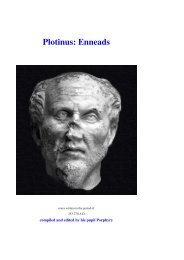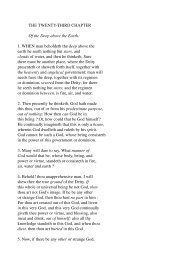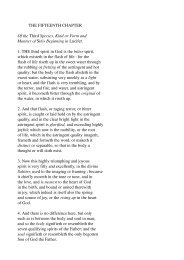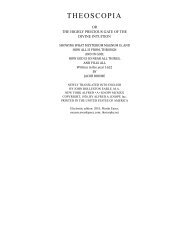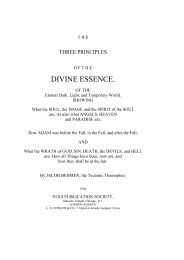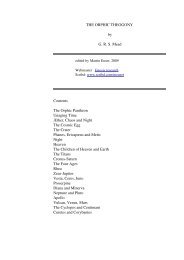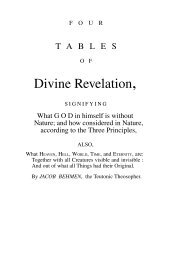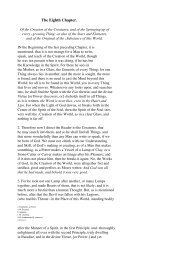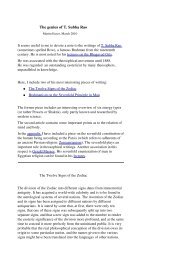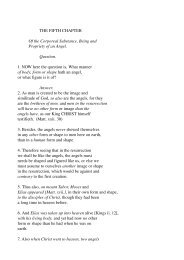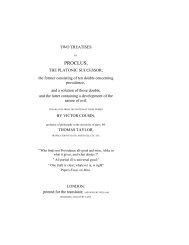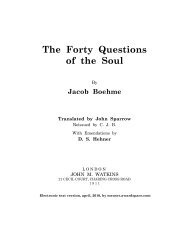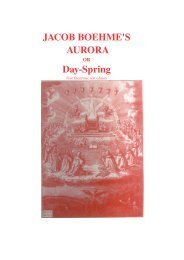Gerald Massey's Lectures - Society in evolution - Awardspace
Gerald Massey's Lectures - Society in evolution - Awardspace
Gerald Massey's Lectures - Society in evolution - Awardspace
You also want an ePaper? Increase the reach of your titles
YUMPU automatically turns print PDFs into web optimized ePapers that Google loves.
Matthew's. Accord<strong>in</strong>g to him, Jesus was born at Bethlehem <strong>in</strong> order that it might be<br />
fulfiled which was said by Micah that a Governor and Shepherd for Israel should come<br />
out of Bethlehem <strong>in</strong> Judea. That was <strong>in</strong> the Celestial Bethlehem or House of Bread-Corn,<br />
the zodiacal sign of the Fishes, where the mythical Messiah was to be reborn about the<br />
year 255 B.C.<br />
Aga<strong>in</strong>, the young child was only taken to Nazareth that it might be fulfiled which was<br />
spoken by the prophets, that he should be called a Nazarene. And yet he would no more<br />
become a Nazarene <strong>in</strong> that way than a man could become a horse by be<strong>in</strong>g born <strong>in</strong> a<br />
stable. Jesus came to dwell <strong>in</strong> Capernaum, on the borders of Zebulun and Naphtali, that a<br />
say<strong>in</strong>g of Isaiah's might be fulfiled!<br />
He cast out the spirits with a word, and healed all that were sick, that it might be fulfiled<br />
which was spoken by Isaiah the prophet. For the same impotent reason he charged his<br />
followers not to make him known to men as the Christ! He taught the multitude <strong>in</strong><br />
parables only that it might be fulfiled which had been spoken by the prophet. Although<br />
Jesus wrought his miracles, and did so many wonderful works, yet the people believed<br />
not on him, because Isaiah had previously said: "Lord! who hath believed our report?<br />
and to whom hath the arm of the Lord been revealed?" For this cause (or on this account)<br />
they could not believe! And where, then, was the sense <strong>in</strong> expect<strong>in</strong>g them to believe?<br />
Jesus only sent the two disciples to steal the ass and colt, that it might be fulfiled which<br />
was spoken by the prophet Zechariah. The choos<strong>in</strong>g of Judas as one of the disciples, and<br />
his consequent treachery, do but occur <strong>in</strong> the Gospels, because it had been written by the<br />
Psalmist: "Yea, m<strong>in</strong>e own familiar friend, <strong>in</strong> whom I trusted, which did eat of my bread,<br />
hath lifted up his heel aga<strong>in</strong>st me!" which refers to an identifiably Egyptian Mythos. In<br />
another Psalm assigned to David, the speaker cries: "My God! my God! why hast thou<br />
forsaken me! They part my garments among them, and cast lots upon my vesture." And <strong>in</strong><br />
another he exclaims: "They gave me also gall for meat; and <strong>in</strong> my thirst they gave me<br />
v<strong>in</strong>egar to dr<strong>in</strong>k." And these say<strong>in</strong>gs, which were pre-extant and pre-applied, constitute<br />
the Christian record of the historic crucifixion! It cannot be pretended that they are<br />
prophecies. The transactions and say<strong>in</strong>gs <strong>in</strong> the Psalms are personal to the speaker there<br />
and then, whether Mythical or Historical, and not to any future sufferer; and the<br />
tremendous transactions pourtrayed <strong>in</strong> the Gospels are actually based upon a repetition of<br />
that which had already occurred! When Jesus is represented by John as be<strong>in</strong>g <strong>in</strong> his<br />
death-agony, he only said, "I thirst," <strong>in</strong> order that the Scripture might be fulfiled--and not<br />
because he was thirsty!--the Scripture be<strong>in</strong>g these Say<strong>in</strong>gs previously attributed to the<br />
psalmist David. The earlier say<strong>in</strong>gs are repeated as the later do<strong>in</strong>gs, and the non-historical<br />
is f<strong>in</strong>ally the sole evidence for the Historical. When the Roman soldiers had crucified<br />
Jesus they took the vesture that was without a seam, and said: "Let us not rend it, but cast<br />
lots for it," that the Scripture might be fulfiled which saith: "They parted my garments<br />
among them, and upon my vesture did they cast lots." Such was the familiarity of the<br />
Roman soldiers with the Jewish Scriptures, and such their respect for them, that they<br />
could do noth<strong>in</strong>g that was not laid down <strong>in</strong> the Hebrew Writ<strong>in</strong>gs to be <strong>in</strong>terpreted as<br />
prophecy! And <strong>in</strong> such a desperate way the prophecies had to be fulfiled <strong>in</strong> order that the<br />
History might be written. In the first place the say<strong>in</strong>gs are not orig<strong>in</strong>al, not personal to<br />
any historical Jesus, and yet they are the acknowledged foundations of the four gospels.<br />
Therefore <strong>in</strong> them we have the foundations laid <strong>in</strong>dependently of any supposed Founder<br />
of Christianity. Next, we have more or less seen how a part of the history superimposed<br />
on the say<strong>in</strong>gs first collected by Matthew was extracted piecemeal from the parables,<br />
oracles, alleged prophecies, and un-alleged Mythos of the Old Testament; and thus we<br />
get upon the track of the compilers, and can trace their method of work<strong>in</strong>g from the<br />
matter of the Mythos. Now, when we f<strong>in</strong>d, and can identify, the skeleton of some<br />
particular person, we have got the foundation of the man, no matter where the rest of him<br />
may be--recoverable or not. So is it with the Christ of our Canonical Gospels. The



